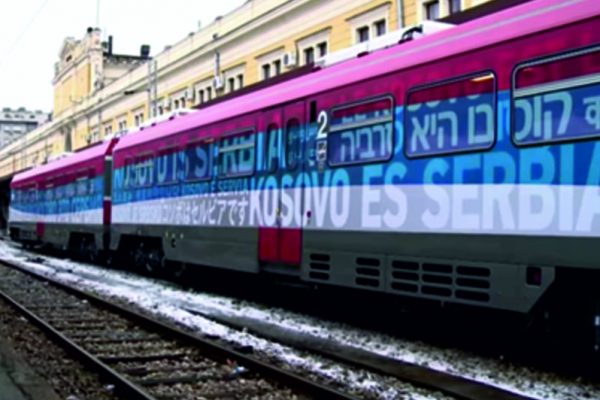Warmongering has always been an instrument which is used by elites to neutralize social resistance. When people start to raise their voices against the poverty and inequality and when the elites sense that their power and privileges are under threat, they use nationalist rhetoric to redirect the anger of the oppressed people. By using cheap and flammable nationalist rhetoric they convince people that their enemy is not the domestic economic and political elite which made them poor, but the similar poor and hungry people of other countries. Even though elites cause wars, they are not the ones who take up the guns and go onto the battlefields. Instead, it’s the ordinary people who fight against each other. As famous Serbian socialist, DimitrijeTucovic, said over a century ago, “rich people sent their oxen to the war and poor people sent their sons”.
Even though this is a well-known phenomena in the countries of ex-Yugoslavia, it seems that the elites of those countries are trying once more to use the same tactic. Two and a half decades after the bloody breakup of Yugoslavia and restoration of capitalism in the area, these societies are falling apart. Small numbers of oligarchs collected all social wealth through predatory privatizations, domestic industry was destroyed, the public education and healthcare systems are being destroyed, unemployment and poverty are on an alarming rise, and widespread corruption and authoritarian rule are making living conditions unbearable. In this situation, people all over the region are protesting and demanding justice and equality. Mass workers protests in Bosnia in 2014, recent protests in Macedonia and mass citizens protests in Belgrade and Zagreb, are just the top of the iceberg of the people’s revolt. Elites are well aware of this and they realize that the current social-economic system and their privileges are under the threat, so they are trying to turn the oppressed people against each other. Recent tensions in the region show this very clearly. Through their dangerous statements, politicians of those countries are waking up the ghosts of the past and making the theme of war a regular part of public discourse.
First, tensions escalated in Bosnia about the referendum in the Republic of Srpska. Instead of dealing with the issues of unemployment and poverty which are enormous in all three parts of Bosnia, national leaders of Serbs, Croats and Muslims were competing over who could make a bolder war statement. This whole situation at the end was useful only for them to gain some political points and continue with their disastrous economic policies. As one Bosnian hip hop artist said in one of his songs, “you are representing three nations, but you are stealing in the team”.
After Bosnia, tensions escalated between Serbia and Croatia. Again, both governments were competing over who could make the more flammable statement, which created a very tense atmosphere in the region once again. In Serbia today, the same parties that led people into the war and suffering during the 90’s are in power. After the colored revolution in 2000, “Democrats” destroyed the domestic economy with their neoliberal policies which brought back to power the parties from the 90’s. The Serbian Progressive Party (party created from the extreme-right Serbian Radical Party of Vojislav Seselj) and “Socialist” party of Serbia (party of Slobodan Milosevic) are imposing harsh austerity measures under the dictate of the IMF which causes enormous inequality and poverty. Since their policies are facing massive resistance, they are now trying to neutralize the situation using what they are best at – cheap nationalist rhetoric. In Croatia, the situation is very similar. The Croatian democratic union, nationalist party which also ruled during the war is still in power. The exceptions were the two mandates of Social-democrats, but their policy was not much different, since they turned right, like all of the European social-democrats.
The most recent tension escalated between the Serbian government and the government in Pristina. The Serbian government sent a train from Belgrade to the Serbian part of Kosovo, on which was written “Kosovo is Serbia” in 20 different languages. Kosovo’s government sent special police units to stop the train which then Serbian prime minister, in his dramatic manner, interpreted as an act of war. Officials on both sides were releasing flammable war statements again, and the Serbian president even stated that he would go to war himself if necessary. The situation with the provisional government in Pristina is no better than the others in the region, since Kosovo today functions as a colonial protectorate of NATO forces andalso because the president of Kosovo is another well-known figure from the 90’s, Hasim Taci, who is accused of war crimes. With this kind of leadership, the people of the West Balkans have a lot of reasons to fear for their future.
Since DiEM25 is a movement in whose core is international solidarity against the reactionary forces which threaten to destroy EU, we, DiEM25 members from Serbia and Croatia, are calling for united action against these attempts of the elite to divide the people of the region. We, like the majority of people in our countries, are not buying these lame attempts and we will not tolerate the spreading of war propaganda and the creation of nationalist tensions. We are calling all of the progressive organizations, movements and individuals to raise their voice together against this madness and to join the resistance. Right-wing populists are flourishing everywhere due to the economic crisis, dividing people of different nations, religions and color and only through international solidarity we could stop them and build another, democratic Europe.
Carpe DiEM25!
DSC Beograd 1 & DSC Zagreb 1

Cover picture: youtube screenshot
Do you want to be informed of DiEM25's actions? Sign up here















